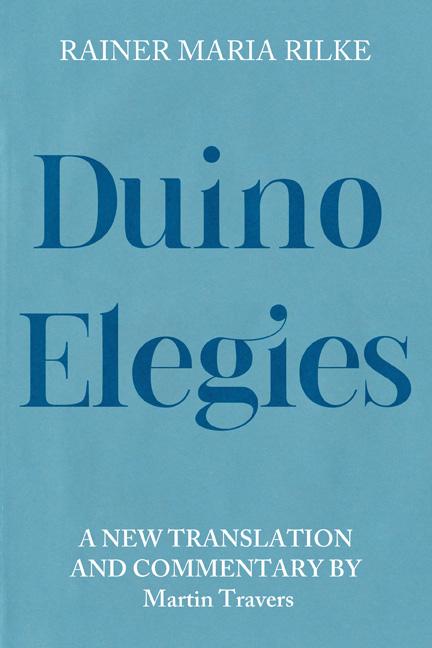Elegy 2
Published online by Cambridge University Press: 10 January 2024
Summary
The absolute requirements of absolute love and the inconstant affections of relative “love,” the attainment of beauty that should belong to us (but does not), and the instability of the human in contrast to the stability of the object world are some of the themes of the second Elegy, and they are explored within the context of speculations about what a real self might be in terms of “being” (“Sein”). The elegiac voice of Elegy 1 now gives way to a methodical discursivity, which forms the medium for a speaking subject impatient to get to the truth, so that it might interrogate the complex evasions of selfhood, linguistic and attitudinal, that adhere not only to lovers but to all who are condemned to stand on the wrong side of the Angelic.
The Elegy opens with yet a further call to the Angels, whose dark presence, here, as elsewhere in the Elegies, is seen both as threat and promise, their existence pointing to a higher realm, a realm from which we know that we must remain excluded. It begins not in the conditional mood of the first Elegy but with the simple present tense, stating what is. It seems that we have learnt a lesson:
Jeder Engel ist schrecklich. Und dennoch, weh mir,
ansing ich euch, fast tödliche Vögel der Seele,
wissend um euch.
Wohin sind die Tage Tobiae,
da der Strahlendsten einer stand an der einfachen Haustür,
zur Reise ein wenig verkleidet und schon nicht mehr furchtbar;
(Jüngling dem Jüngling, wie er neugierig hinaussah).
Träte der Erzengel jetzt, der gefährliche, hinter den Sternen
eines Schrittes nur nieder und herwärts:
hochaufschlagend erschlüg uns das eigene Herz. Wer seid ihr?
Frühe Geglückte, ihr Verwöhnten der Schöpfung,
Höhenzüge, morgenrötliche Grate
aller Erschaffung,—
Pollen der blühenden Gottheit,
Gelenke des Lichtes, Gänge, Treppen, Throne,
Räume aus Wesen, Schilde aus Wonne, Tumulte
stürmisch entzückten Gefühls und plötzlich, einzeln,
Spiegel: die die entströmte eigene Schönheit
wiederschöpfen zurück in das eigene Antlitz.
- Type
- Chapter
- Information
- Duino ElegiesA New Translation and Commentary, pp. 63 - 96Publisher: Boydell & BrewerPrint publication year: 2023

